Business Decision Making: Investment Appraisal and Performance Ratios
VerifiedAdded on 2023/06/17
|11
|1980
|215
Report
AI Summary
This report provides a comprehensive analysis of business decision-making through investment appraisal techniques and accounting ratios. The first section evaluates project investments using methods like payback period, accounting rate of return, net present value, and internal rate of return, highlighting their advantages and disadvantages, ultimately recommending the Manchester project based on its favorable results. The second section assesses Tesco's performance using accounting ratios, noting its fluctuating return on capital employed and liquidity, while also discussing the limitations of accounting ratios and external factors impacting Tesco's position, such as demand, innovation, and labor costs. The report concludes that while appraisal techniques and accounting ratios have limitations, they are crucial tools for making informed business decisions. Desklib offers a range of similar solved assignments and study resources for students.

Business Decision
Making
Making
Paraphrase This Document
Need a fresh take? Get an instant paraphrase of this document with our AI Paraphraser
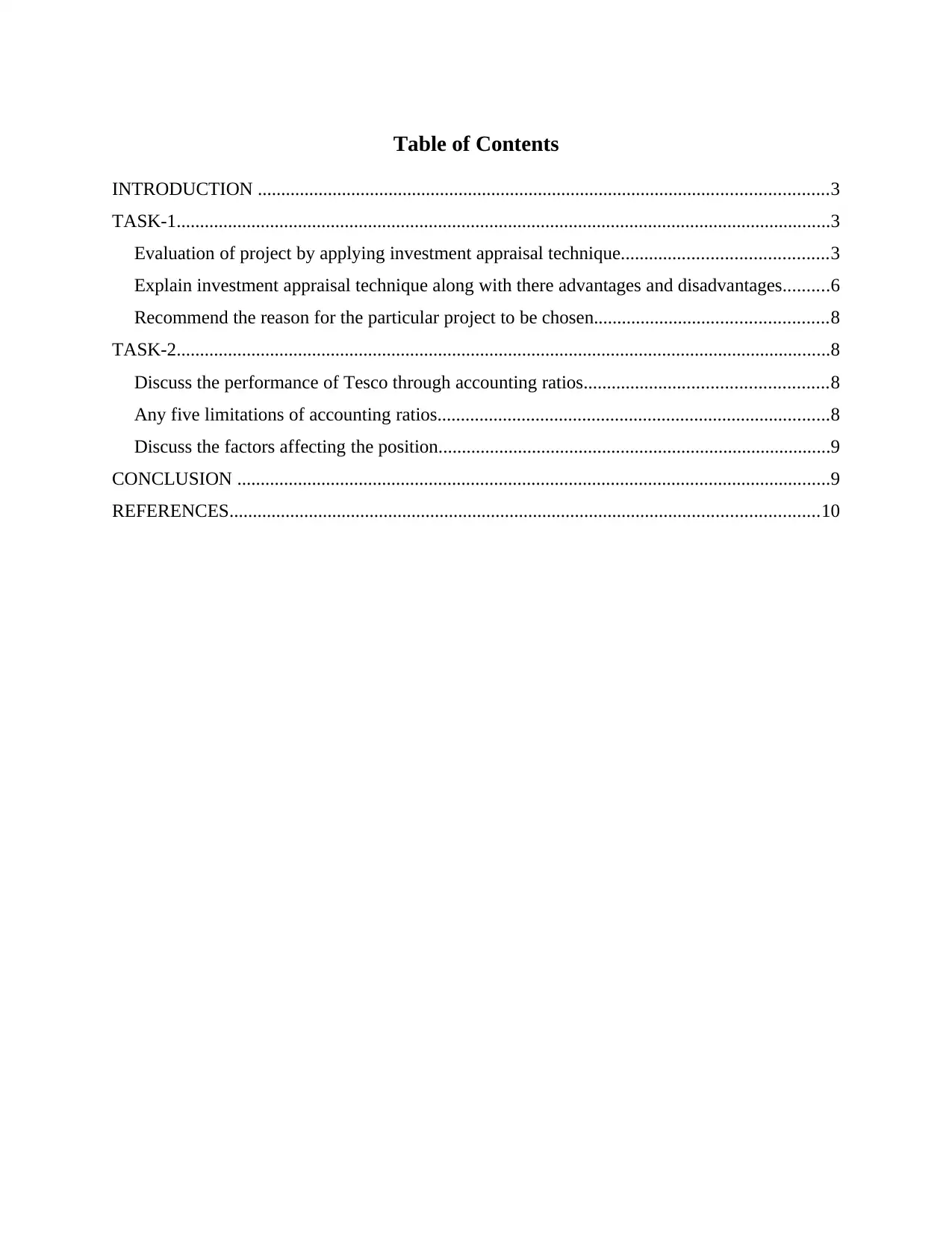
Table of Contents
INTRODUCTION ..........................................................................................................................3
TASK-1............................................................................................................................................3
Evaluation of project by applying investment appraisal technique............................................3
Explain investment appraisal technique along with there advantages and disadvantages..........6
Recommend the reason for the particular project to be chosen..................................................8
TASK-2............................................................................................................................................8
Discuss the performance of Tesco through accounting ratios....................................................8
Any five limitations of accounting ratios....................................................................................8
Discuss the factors affecting the position....................................................................................9
CONCLUSION ...............................................................................................................................9
REFERENCES..............................................................................................................................10
INTRODUCTION ..........................................................................................................................3
TASK-1............................................................................................................................................3
Evaluation of project by applying investment appraisal technique............................................3
Explain investment appraisal technique along with there advantages and disadvantages..........6
Recommend the reason for the particular project to be chosen..................................................8
TASK-2............................................................................................................................................8
Discuss the performance of Tesco through accounting ratios....................................................8
Any five limitations of accounting ratios....................................................................................8
Discuss the factors affecting the position....................................................................................9
CONCLUSION ...............................................................................................................................9
REFERENCES..............................................................................................................................10
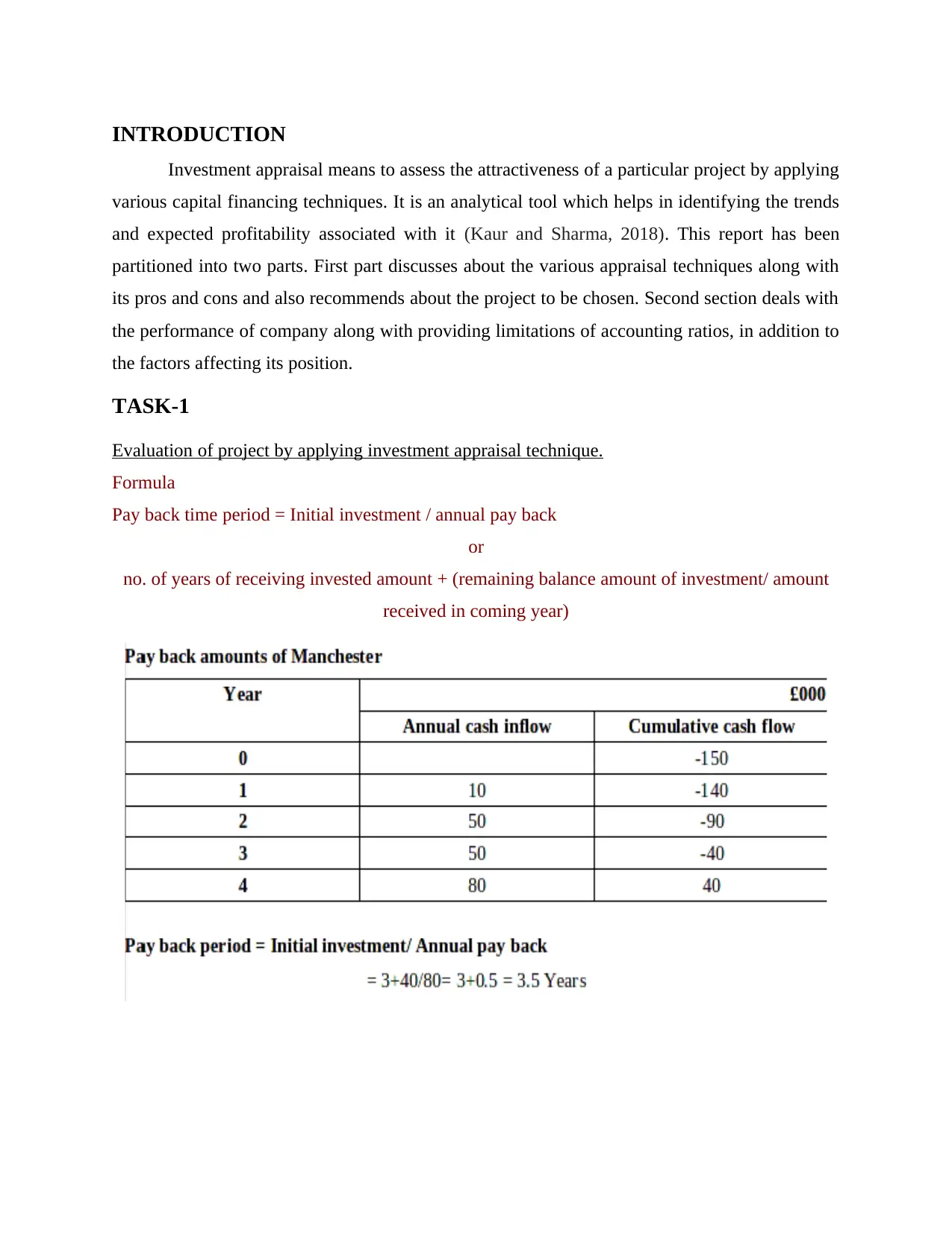
INTRODUCTION
Investment appraisal means to assess the attractiveness of a particular project by applying
various capital financing techniques. It is an analytical tool which helps in identifying the trends
and expected profitability associated with it (Kaur and Sharma, 2018). This report has been
partitioned into two parts. First part discusses about the various appraisal techniques along with
its pros and cons and also recommends about the project to be chosen. Second section deals with
the performance of company along with providing limitations of accounting ratios, in addition to
the factors affecting its position.
TASK-1
Evaluation of project by applying investment appraisal technique.
Formula
Pay back time period = Initial investment / annual pay back
or
no. of years of receiving invested amount + (remaining balance amount of investment/ amount
received in coming year)
Investment appraisal means to assess the attractiveness of a particular project by applying
various capital financing techniques. It is an analytical tool which helps in identifying the trends
and expected profitability associated with it (Kaur and Sharma, 2018). This report has been
partitioned into two parts. First part discusses about the various appraisal techniques along with
its pros and cons and also recommends about the project to be chosen. Second section deals with
the performance of company along with providing limitations of accounting ratios, in addition to
the factors affecting its position.
TASK-1
Evaluation of project by applying investment appraisal technique.
Formula
Pay back time period = Initial investment / annual pay back
or
no. of years of receiving invested amount + (remaining balance amount of investment/ amount
received in coming year)
⊘ This is a preview!⊘
Do you want full access?
Subscribe today to unlock all pages.

Trusted by 1+ million students worldwide
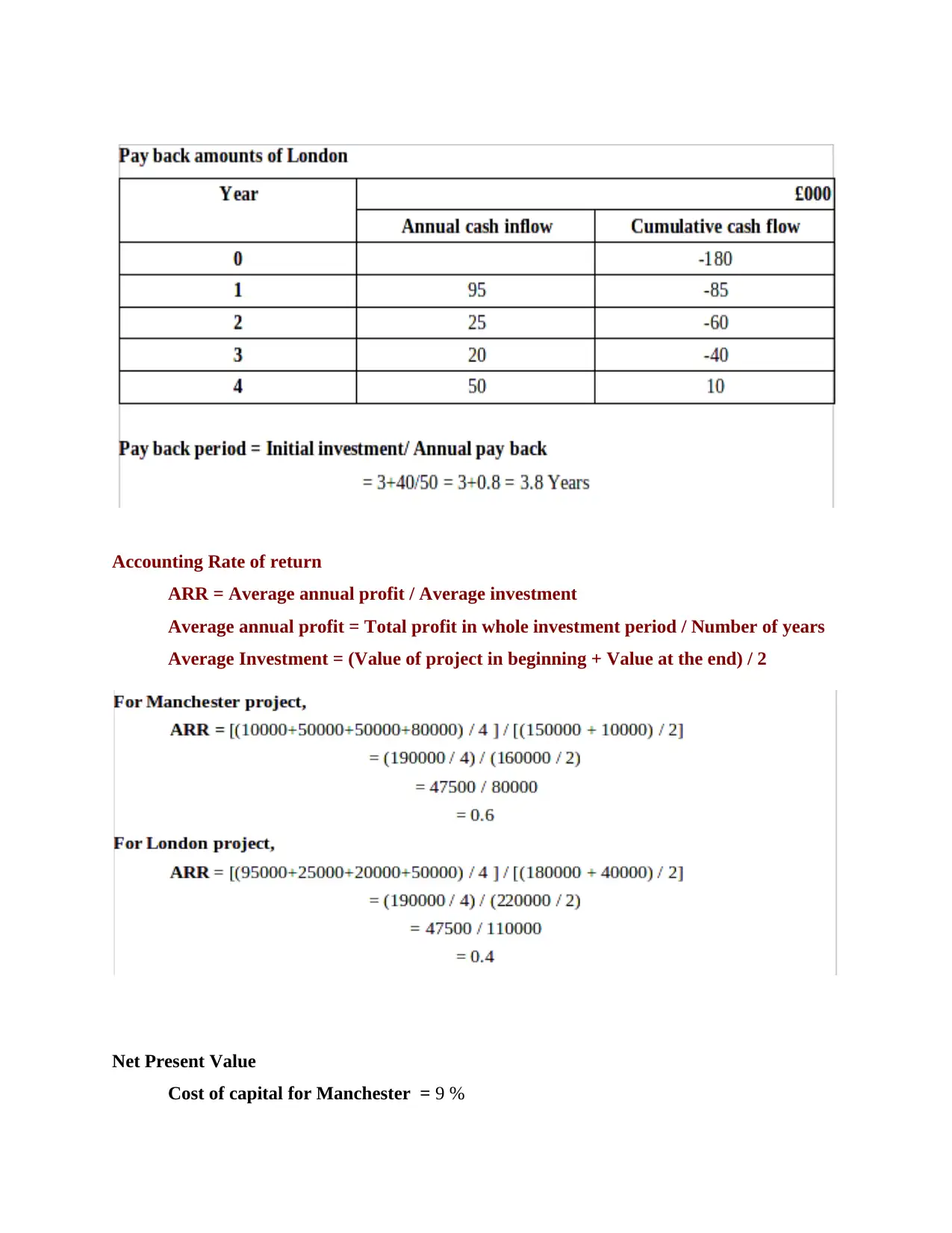
Accounting Rate of return
ARR = Average annual profit / Average investment
Average annual profit = Total profit in whole investment period / Number of years
Average Investment = (Value of project in beginning + Value at the end) / 2
Net Present Value
Cost of capital for Manchester = 9 %
ARR = Average annual profit / Average investment
Average annual profit = Total profit in whole investment period / Number of years
Average Investment = (Value of project in beginning + Value at the end) / 2
Net Present Value
Cost of capital for Manchester = 9 %
Paraphrase This Document
Need a fresh take? Get an instant paraphrase of this document with our AI Paraphraser
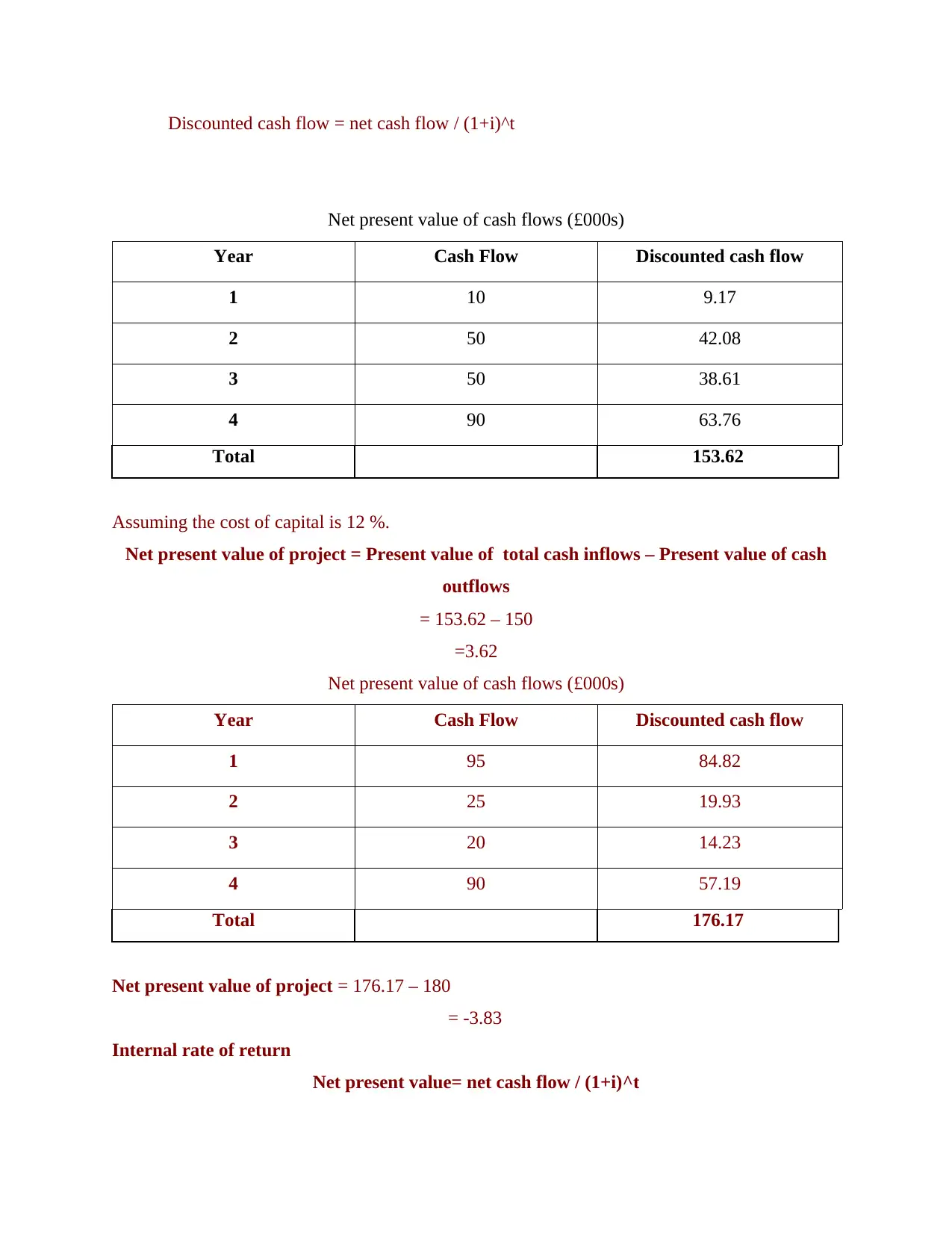
Discounted cash flow = net cash flow / (1+i)^t
Net present value of cash flows (£000s)
Year Cash Flow Discounted cash flow
1 10 9.17
2 50 42.08
3 50 38.61
4 90 63.76
Total 153.62
Assuming the cost of capital is 12 %.
Net present value of project = Present value of total cash inflows – Present value of cash
outflows
= 153.62 – 150
=3.62
Net present value of cash flows (£000s)
Year Cash Flow Discounted cash flow
1 95 84.82
2 25 19.93
3 20 14.23
4 90 57.19
Total 176.17
Net present value of project = 176.17 – 180
= -3.83
Internal rate of return
Net present value= net cash flow / (1+i)^t
Net present value of cash flows (£000s)
Year Cash Flow Discounted cash flow
1 10 9.17
2 50 42.08
3 50 38.61
4 90 63.76
Total 153.62
Assuming the cost of capital is 12 %.
Net present value of project = Present value of total cash inflows – Present value of cash
outflows
= 153.62 – 150
=3.62
Net present value of cash flows (£000s)
Year Cash Flow Discounted cash flow
1 95 84.82
2 25 19.93
3 20 14.23
4 90 57.19
Total 176.17
Net present value of project = 176.17 – 180
= -3.83
Internal rate of return
Net present value= net cash flow / (1+i)^t
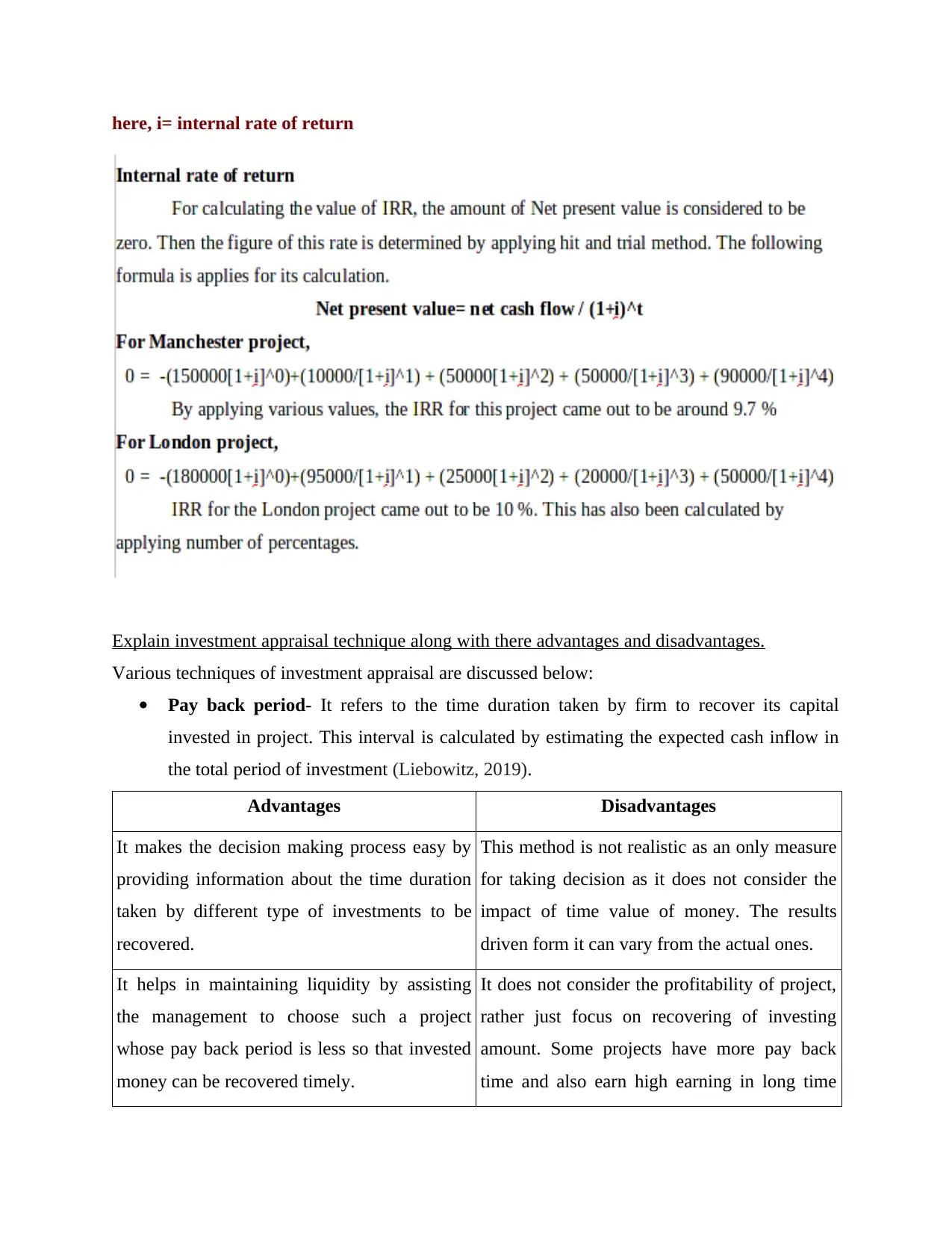
here, i= internal rate of return
Explain investment appraisal technique along with there advantages and disadvantages.
Various techniques of investment appraisal are discussed below:
Pay back period- It refers to the time duration taken by firm to recover its capital
invested in project. This interval is calculated by estimating the expected cash inflow in
the total period of investment (Liebowitz, 2019).
Advantages Disadvantages
It makes the decision making process easy by
providing information about the time duration
taken by different type of investments to be
recovered.
This method is not realistic as an only measure
for taking decision as it does not consider the
impact of time value of money. The results
driven form it can vary from the actual ones.
It helps in maintaining liquidity by assisting
the management to choose such a project
whose pay back period is less so that invested
money can be recovered timely.
It does not consider the profitability of project,
rather just focus on recovering of investing
amount. Some projects have more pay back
time and also earn high earning in long time
Explain investment appraisal technique along with there advantages and disadvantages.
Various techniques of investment appraisal are discussed below:
Pay back period- It refers to the time duration taken by firm to recover its capital
invested in project. This interval is calculated by estimating the expected cash inflow in
the total period of investment (Liebowitz, 2019).
Advantages Disadvantages
It makes the decision making process easy by
providing information about the time duration
taken by different type of investments to be
recovered.
This method is not realistic as an only measure
for taking decision as it does not consider the
impact of time value of money. The results
driven form it can vary from the actual ones.
It helps in maintaining liquidity by assisting
the management to choose such a project
whose pay back period is less so that invested
money can be recovered timely.
It does not consider the profitability of project,
rather just focus on recovering of investing
amount. Some projects have more pay back
time and also earn high earning in long time
⊘ This is a preview!⊘
Do you want full access?
Subscribe today to unlock all pages.

Trusted by 1+ million students worldwide
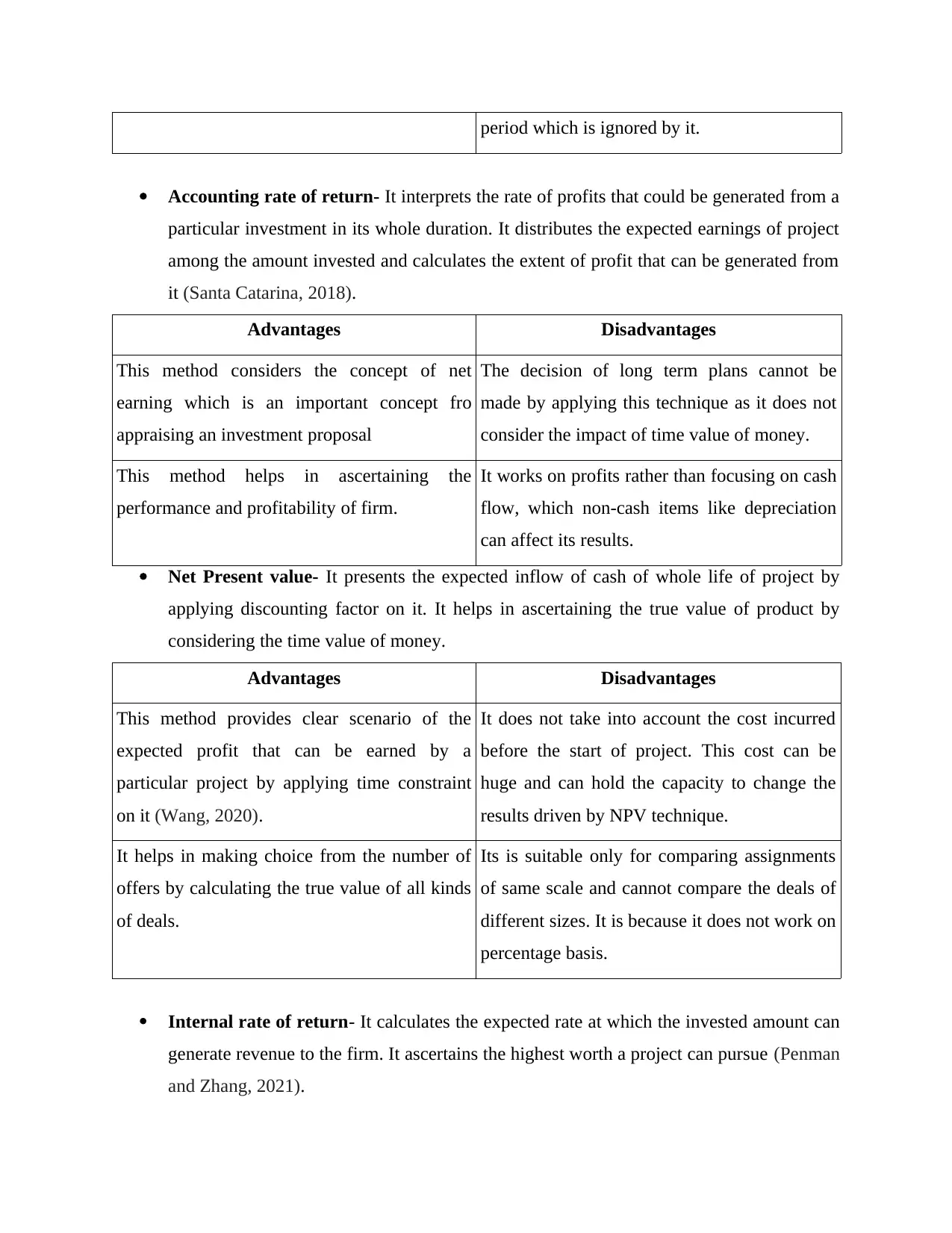
period which is ignored by it.
Accounting rate of return- It interprets the rate of profits that could be generated from a
particular investment in its whole duration. It distributes the expected earnings of project
among the amount invested and calculates the extent of profit that can be generated from
it (Santa Catarina, 2018).
Advantages Disadvantages
This method considers the concept of net
earning which is an important concept fro
appraising an investment proposal
The decision of long term plans cannot be
made by applying this technique as it does not
consider the impact of time value of money.
This method helps in ascertaining the
performance and profitability of firm.
It works on profits rather than focusing on cash
flow, which non-cash items like depreciation
can affect its results.
Net Present value- It presents the expected inflow of cash of whole life of project by
applying discounting factor on it. It helps in ascertaining the true value of product by
considering the time value of money.
Advantages Disadvantages
This method provides clear scenario of the
expected profit that can be earned by a
particular project by applying time constraint
on it (Wang, 2020).
It does not take into account the cost incurred
before the start of project. This cost can be
huge and can hold the capacity to change the
results driven by NPV technique.
It helps in making choice from the number of
offers by calculating the true value of all kinds
of deals.
Its is suitable only for comparing assignments
of same scale and cannot compare the deals of
different sizes. It is because it does not work on
percentage basis.
Internal rate of return- It calculates the expected rate at which the invested amount can
generate revenue to the firm. It ascertains the highest worth a project can pursue (Penman
and Zhang, 2021).
Accounting rate of return- It interprets the rate of profits that could be generated from a
particular investment in its whole duration. It distributes the expected earnings of project
among the amount invested and calculates the extent of profit that can be generated from
it (Santa Catarina, 2018).
Advantages Disadvantages
This method considers the concept of net
earning which is an important concept fro
appraising an investment proposal
The decision of long term plans cannot be
made by applying this technique as it does not
consider the impact of time value of money.
This method helps in ascertaining the
performance and profitability of firm.
It works on profits rather than focusing on cash
flow, which non-cash items like depreciation
can affect its results.
Net Present value- It presents the expected inflow of cash of whole life of project by
applying discounting factor on it. It helps in ascertaining the true value of product by
considering the time value of money.
Advantages Disadvantages
This method provides clear scenario of the
expected profit that can be earned by a
particular project by applying time constraint
on it (Wang, 2020).
It does not take into account the cost incurred
before the start of project. This cost can be
huge and can hold the capacity to change the
results driven by NPV technique.
It helps in making choice from the number of
offers by calculating the true value of all kinds
of deals.
Its is suitable only for comparing assignments
of same scale and cannot compare the deals of
different sizes. It is because it does not work on
percentage basis.
Internal rate of return- It calculates the expected rate at which the invested amount can
generate revenue to the firm. It ascertains the highest worth a project can pursue (Penman
and Zhang, 2021).
Paraphrase This Document
Need a fresh take? Get an instant paraphrase of this document with our AI Paraphraser
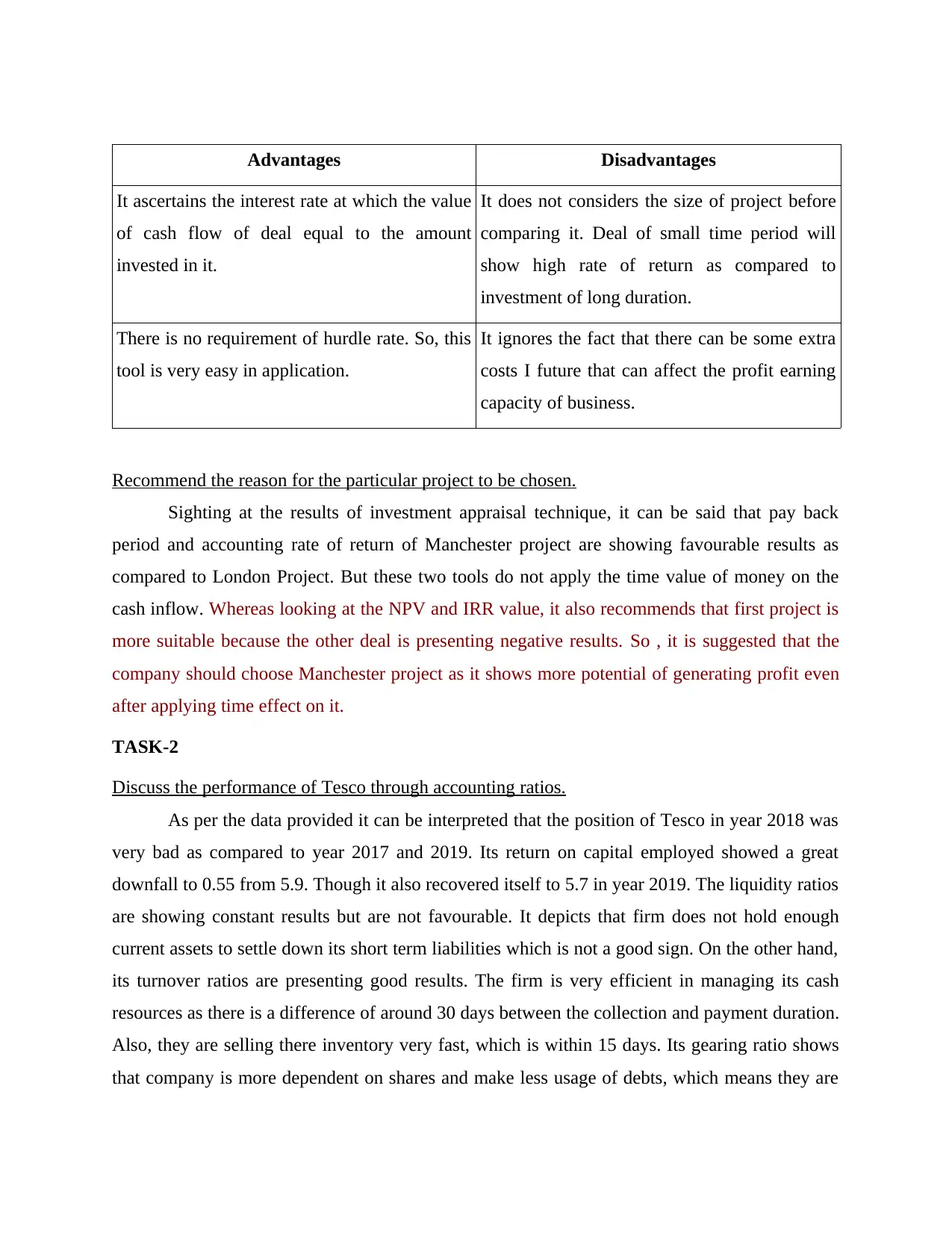
Advantages Disadvantages
It ascertains the interest rate at which the value
of cash flow of deal equal to the amount
invested in it.
It does not considers the size of project before
comparing it. Deal of small time period will
show high rate of return as compared to
investment of long duration.
There is no requirement of hurdle rate. So, this
tool is very easy in application.
It ignores the fact that there can be some extra
costs I future that can affect the profit earning
capacity of business.
Recommend the reason for the particular project to be chosen.
Sighting at the results of investment appraisal technique, it can be said that pay back
period and accounting rate of return of Manchester project are showing favourable results as
compared to London Project. But these two tools do not apply the time value of money on the
cash inflow. Whereas looking at the NPV and IRR value, it also recommends that first project is
more suitable because the other deal is presenting negative results. So , it is suggested that the
company should choose Manchester project as it shows more potential of generating profit even
after applying time effect on it.
TASK-2
Discuss the performance of Tesco through accounting ratios.
As per the data provided it can be interpreted that the position of Tesco in year 2018 was
very bad as compared to year 2017 and 2019. Its return on capital employed showed a great
downfall to 0.55 from 5.9. Though it also recovered itself to 5.7 in year 2019. The liquidity ratios
are showing constant results but are not favourable. It depicts that firm does not hold enough
current assets to settle down its short term liabilities which is not a good sign. On the other hand,
its turnover ratios are presenting good results. The firm is very efficient in managing its cash
resources as there is a difference of around 30 days between the collection and payment duration.
Also, they are selling there inventory very fast, which is within 15 days. Its gearing ratio shows
that company is more dependent on shares and make less usage of debts, which means they are
It ascertains the interest rate at which the value
of cash flow of deal equal to the amount
invested in it.
It does not considers the size of project before
comparing it. Deal of small time period will
show high rate of return as compared to
investment of long duration.
There is no requirement of hurdle rate. So, this
tool is very easy in application.
It ignores the fact that there can be some extra
costs I future that can affect the profit earning
capacity of business.
Recommend the reason for the particular project to be chosen.
Sighting at the results of investment appraisal technique, it can be said that pay back
period and accounting rate of return of Manchester project are showing favourable results as
compared to London Project. But these two tools do not apply the time value of money on the
cash inflow. Whereas looking at the NPV and IRR value, it also recommends that first project is
more suitable because the other deal is presenting negative results. So , it is suggested that the
company should choose Manchester project as it shows more potential of generating profit even
after applying time effect on it.
TASK-2
Discuss the performance of Tesco through accounting ratios.
As per the data provided it can be interpreted that the position of Tesco in year 2018 was
very bad as compared to year 2017 and 2019. Its return on capital employed showed a great
downfall to 0.55 from 5.9. Though it also recovered itself to 5.7 in year 2019. The liquidity ratios
are showing constant results but are not favourable. It depicts that firm does not hold enough
current assets to settle down its short term liabilities which is not a good sign. On the other hand,
its turnover ratios are presenting good results. The firm is very efficient in managing its cash
resources as there is a difference of around 30 days between the collection and payment duration.
Also, they are selling there inventory very fast, which is within 15 days. Its gearing ratio shows
that company is more dependent on shares and make less usage of debts, which means they are
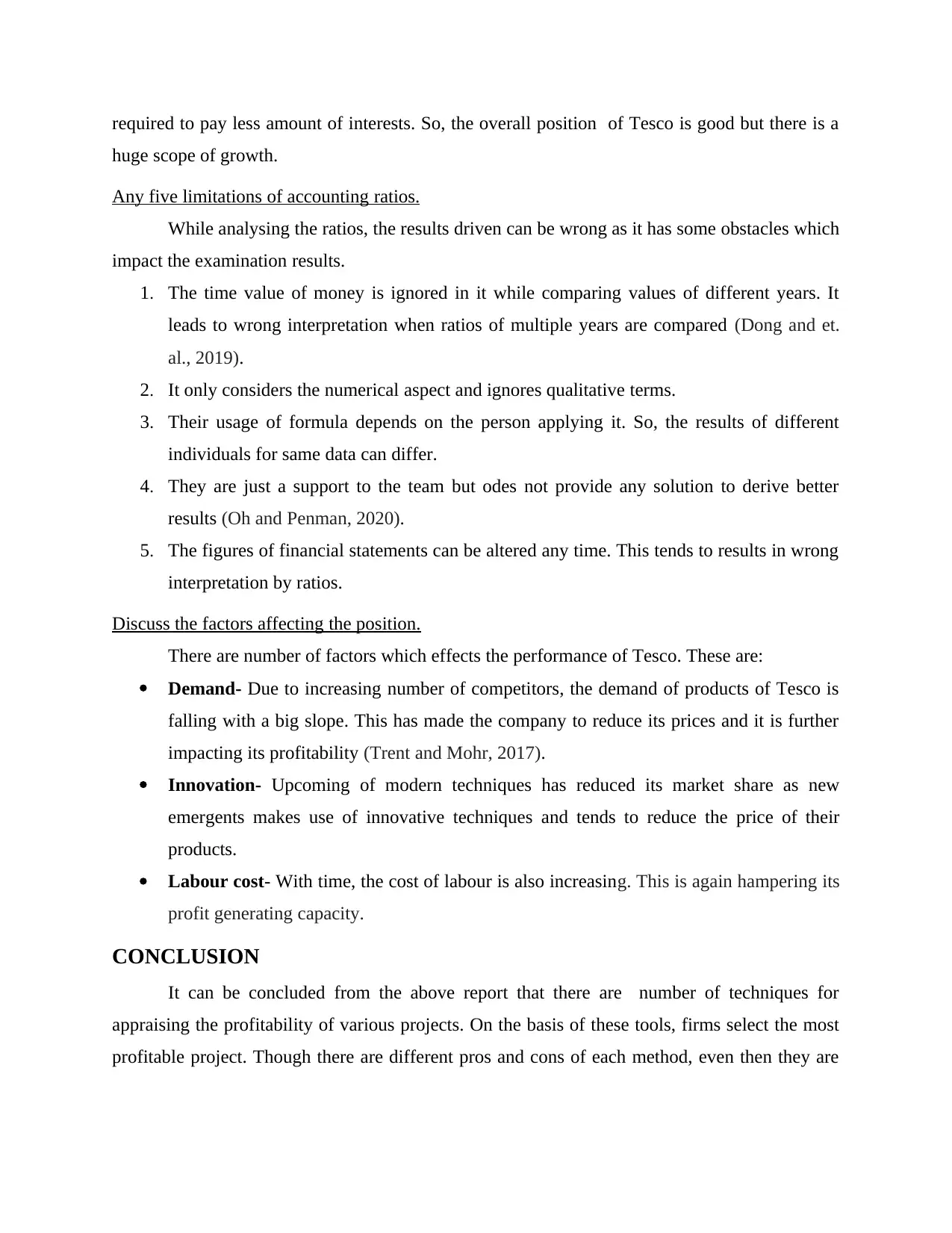
required to pay less amount of interests. So, the overall position of Tesco is good but there is a
huge scope of growth.
Any five limitations of accounting ratios.
While analysing the ratios, the results driven can be wrong as it has some obstacles which
impact the examination results.
1. The time value of money is ignored in it while comparing values of different years. It
leads to wrong interpretation when ratios of multiple years are compared (Dong and et.
al., 2019).
2. It only considers the numerical aspect and ignores qualitative terms.
3. Their usage of formula depends on the person applying it. So, the results of different
individuals for same data can differ.
4. They are just a support to the team but odes not provide any solution to derive better
results (Oh and Penman, 2020).
5. The figures of financial statements can be altered any time. This tends to results in wrong
interpretation by ratios.
Discuss the factors affecting the position.
There are number of factors which effects the performance of Tesco. These are:
Demand- Due to increasing number of competitors, the demand of products of Tesco is
falling with a big slope. This has made the company to reduce its prices and it is further
impacting its profitability (Trent and Mohr, 2017).
Innovation- Upcoming of modern techniques has reduced its market share as new
emergents makes use of innovative techniques and tends to reduce the price of their
products.
Labour cost- With time, the cost of labour is also increasing. This is again hampering its
profit generating capacity.
CONCLUSION
It can be concluded from the above report that there are number of techniques for
appraising the profitability of various projects. On the basis of these tools, firms select the most
profitable project. Though there are different pros and cons of each method, even then they are
huge scope of growth.
Any five limitations of accounting ratios.
While analysing the ratios, the results driven can be wrong as it has some obstacles which
impact the examination results.
1. The time value of money is ignored in it while comparing values of different years. It
leads to wrong interpretation when ratios of multiple years are compared (Dong and et.
al., 2019).
2. It only considers the numerical aspect and ignores qualitative terms.
3. Their usage of formula depends on the person applying it. So, the results of different
individuals for same data can differ.
4. They are just a support to the team but odes not provide any solution to derive better
results (Oh and Penman, 2020).
5. The figures of financial statements can be altered any time. This tends to results in wrong
interpretation by ratios.
Discuss the factors affecting the position.
There are number of factors which effects the performance of Tesco. These are:
Demand- Due to increasing number of competitors, the demand of products of Tesco is
falling with a big slope. This has made the company to reduce its prices and it is further
impacting its profitability (Trent and Mohr, 2017).
Innovation- Upcoming of modern techniques has reduced its market share as new
emergents makes use of innovative techniques and tends to reduce the price of their
products.
Labour cost- With time, the cost of labour is also increasing. This is again hampering its
profit generating capacity.
CONCLUSION
It can be concluded from the above report that there are number of techniques for
appraising the profitability of various projects. On the basis of these tools, firms select the most
profitable project. Though there are different pros and cons of each method, even then they are
⊘ This is a preview!⊘
Do you want full access?
Subscribe today to unlock all pages.

Trusted by 1+ million students worldwide

very helpful. In the same way, accounting ratios are also important for analysing the performance
of business, though they too have some limitations.
of business, though they too have some limitations.
Paraphrase This Document
Need a fresh take? Get an instant paraphrase of this document with our AI Paraphraser
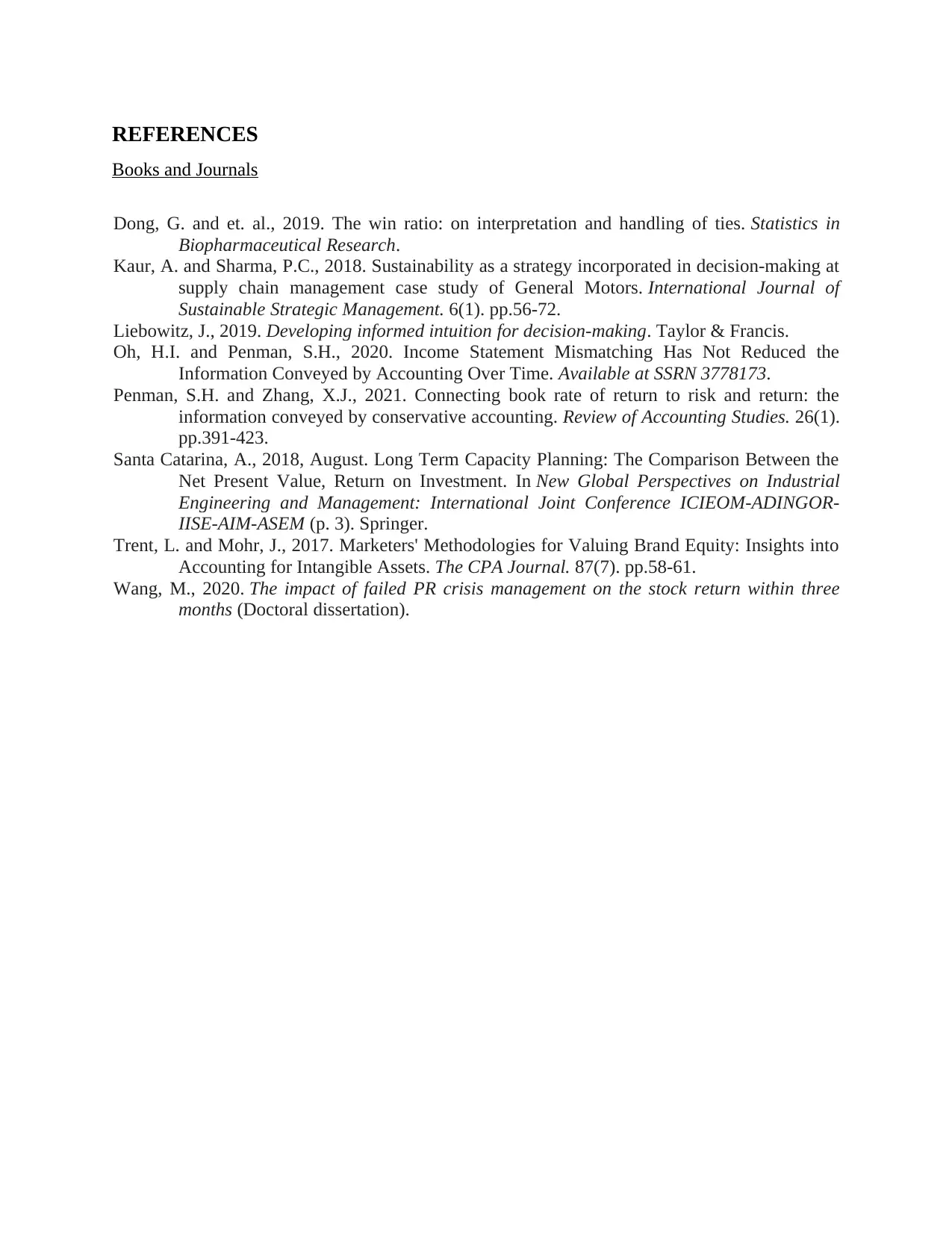
REFERENCES
Books and Journals
Dong, G. and et. al., 2019. The win ratio: on interpretation and handling of ties. Statistics in
Biopharmaceutical Research.
Kaur, A. and Sharma, P.C., 2018. Sustainability as a strategy incorporated in decision-making at
supply chain management case study of General Motors. International Journal of
Sustainable Strategic Management. 6(1). pp.56-72.
Liebowitz, J., 2019. Developing informed intuition for decision-making. Taylor & Francis.
Oh, H.I. and Penman, S.H., 2020. Income Statement Mismatching Has Not Reduced the
Information Conveyed by Accounting Over Time. Available at SSRN 3778173.
Penman, S.H. and Zhang, X.J., 2021. Connecting book rate of return to risk and return: the
information conveyed by conservative accounting. Review of Accounting Studies. 26(1).
pp.391-423.
Santa Catarina, A., 2018, August. Long Term Capacity Planning: The Comparison Between the
Net Present Value, Return on Investment. In New Global Perspectives on Industrial
Engineering and Management: International Joint Conference ICIEOM-ADINGOR-
IISE-AIM-ASEM (p. 3). Springer.
Trent, L. and Mohr, J., 2017. Marketers' Methodologies for Valuing Brand Equity: Insights into
Accounting for Intangible Assets. The CPA Journal. 87(7). pp.58-61.
Wang, M., 2020. The impact of failed PR crisis management on the stock return within three
months (Doctoral dissertation).
Books and Journals
Dong, G. and et. al., 2019. The win ratio: on interpretation and handling of ties. Statistics in
Biopharmaceutical Research.
Kaur, A. and Sharma, P.C., 2018. Sustainability as a strategy incorporated in decision-making at
supply chain management case study of General Motors. International Journal of
Sustainable Strategic Management. 6(1). pp.56-72.
Liebowitz, J., 2019. Developing informed intuition for decision-making. Taylor & Francis.
Oh, H.I. and Penman, S.H., 2020. Income Statement Mismatching Has Not Reduced the
Information Conveyed by Accounting Over Time. Available at SSRN 3778173.
Penman, S.H. and Zhang, X.J., 2021. Connecting book rate of return to risk and return: the
information conveyed by conservative accounting. Review of Accounting Studies. 26(1).
pp.391-423.
Santa Catarina, A., 2018, August. Long Term Capacity Planning: The Comparison Between the
Net Present Value, Return on Investment. In New Global Perspectives on Industrial
Engineering and Management: International Joint Conference ICIEOM-ADINGOR-
IISE-AIM-ASEM (p. 3). Springer.
Trent, L. and Mohr, J., 2017. Marketers' Methodologies for Valuing Brand Equity: Insights into
Accounting for Intangible Assets. The CPA Journal. 87(7). pp.58-61.
Wang, M., 2020. The impact of failed PR crisis management on the stock return within three
months (Doctoral dissertation).
1 out of 11
Related Documents
Your All-in-One AI-Powered Toolkit for Academic Success.
+13062052269
info@desklib.com
Available 24*7 on WhatsApp / Email
![[object Object]](/_next/static/media/star-bottom.7253800d.svg)
Unlock your academic potential
Copyright © 2020–2025 A2Z Services. All Rights Reserved. Developed and managed by ZUCOL.





